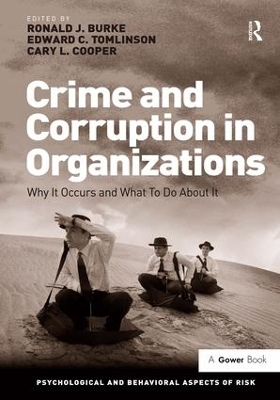
Crime and Corruption in Organizations
Gower Publishing Ltd (Verlag)
978-0-566-08981-7 (ISBN)
Although increasing attention has been paid to it, there are no signs that crime and corruption in organizations is decreasing, so if you're a manager or government policy maker, and your mandate is to reduce crime and corruption, where do you start? The international authors of this book fill a critical need to address such a prevalent and costly topic with a detailed analysis of the risks associated with crime and corruption in organizations. They examine the causes and consequences, and the choices we face in our efforts to eradicate these social maladies. They focus on the risks to individuals and organizations surrounding criminal and corrupt acts, with an emphasis on the psychological, behavioral and organizational factors supporting such behaviors. Finally, they explore the phenomenon of crime and corruption across a diverse array of organizational settings (ranging from public to private, for-profit to non-profit) and occupational categories (e.g., police officers, physicians, accountants, and academicians). The constant barrage of scandals publicized by the media demands 'front burner' attention dedicated to stemming this tide. Accordingly, this book turns to prominent researchers employing their talents to produce more ethical organizations. The result is the most up-to-date thinking on both classic (e.g., cognitive moral development) and novel (e.g., moral attentiveness) approaches to crime and corruption, as well as scientifically-grounded approaches to reducing illicit behavior in organizations.
One of Canada's most prolific researchers, Professor Burke's work has focused on the relationship between the work environment and individual and organizational health. He was the Founding Editor of the Canadian Journal of Administrative Sciences and has served on the editorial boards of more than a dozen journals. He has served as Director of the PhD. Programme at Schulich, and as Associate Dean for Research. He has participated in research conferences in North and South America, the UK, Europe, Asia and Australia. Professor Burke earned his PhD from the University of Michigan and is Professor Emeritus of Organizational Behavior. He has published over 500 journal articles and edited or co-edited 27 books with a variety of publishers. He has participated in over 300 management development programs as well as serving as a consultant on organizational effectiveness issues for private and public sector organizations. His views on management and organizations have also appeared in various media. Edward C. Tomlinson is an associate professor of management and Mulwick Scholar in the Boler School of Business at John Carroll University. He received his Ph.D. from the Fisher College of Business at The Ohio State University. His primary research interests include interpersonal trust, behavioral integrity, and deviant workplace behavior. His research has been published in journals including Academy of Management Review, International Journal of Conflict Management, Journal of Applied Psychology, Journal of Management, and Journal of Management Education. He currently serves on the inaugural editorial board of Journal of Trust Research. Cary L. Cooper, CBE, is Distinguished Professor of Organizational Psychology and Health, Lancaster University Management School at Lancaster University, England. He is the author of over 100 books and 400 scholarly articles, and is a frequent contributor to national newspapers, TV and radio. He is currently Founding Editor of the Journal of Organizational Behavior and Editor in Chief of the medical journal Stress & Health. He is past President of the British Academy of Management, is a Companion of the Chartered Management Institute and one of the first UK based Fellows of the (American) Academy of Management. Professor Cooper is also the President of the Institute of Welfare Officers, President of ISMA, President of the British Association of Counselling and Psychotherapy, President of RELATE and Chair of the Academy of Social Sciences. In 2001, Cary was awarded a CBE by the Queen in the Queen's Birthday Honours List for his contribution to organizational health.
Contents: Part I Introduction: Crime and corruption in organizations, Ronald J. Burke. Part II Causes of Crime and Corruption in Organizations: Show me the money, Ronald J. Burke; Predicting workplace misconduct using personality and academic behaviors, Thomas H. Stone, I. M. Jawahar, and Jennifer L. Kisamore; The role of trust in employee theft, Edward C. Tomlinson; The influence of national culture on the rationalization of corruption, Amy Guerber, Aparna Rajagoplan and Vikas Anand. Part III Costs of Crime and Corruption in Organizations: The debilitating effects of fraud in organizations, Conan C. Albrecht, Matthew L. Sanders, Daniel V. Holland and Chad Albrecht; A re-examination of the withdrawal syndrome vis-à-vis organizational ethics in schools, Zehava Rosenblatt and Orly Shapira-Lishchinsky. Part IV Corruption in the Professions: Making sense of academic misconduct, Alison L. Antes and Michael D. Mumford; Medicines and money: the corruption of clinical information, Joel Lexchin. Part V Reducing Crime and Corruption in Organizations: How to minimize corruption in business organizations: developing and sustaining an ethical corporate culture, Mark S. Schwarz; Confronting corruption using integrity pacts: the case of Nigeria, Wesley Cragg, Uwafiokun Idemudia and Bronwyn Best; Easy prey Canadians, L.S. (Al) Rosen; Index.
| Erscheint lt. Verlag | 21.12.2010 |
|---|---|
| Reihe/Serie | Psychological and Behavioural Aspects of Risk |
| Sprache | englisch |
| Maße | 174 x 246 mm |
| Gewicht | 952 g |
| Themenwelt | Recht / Steuern ► Strafrecht ► Kriminologie |
| Sozialwissenschaften ► Soziologie | |
| Wirtschaft ► Betriebswirtschaft / Management | |
| ISBN-10 | 0-566-08981-5 / 0566089815 |
| ISBN-13 | 978-0-566-08981-7 / 9780566089817 |
| Zustand | Neuware |
| Informationen gemäß Produktsicherheitsverordnung (GPSR) | |
| Haben Sie eine Frage zum Produkt? |
aus dem Bereich


